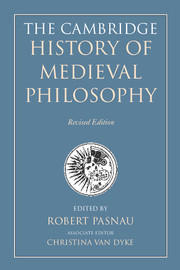Book contents
- Frontmatter
- Contents of Volume 1
- Preface
- List of contributors
- Frontmatter
- Contents of Volume 2
- Introduction
- I Fundamentals
- II Logic and language
- III Natural philosophy
- IV Soul and knowledge
- V Will and desire
- VI Ethics
- 33 Happiness
- 34 Identity and moral agency
- 35 The inclination for justice
- 36 Virtue theory
- 37 Action and intention
- 38 Practical ethics
- VII Political philosophy
- VIII Metaphysics
- IX Theology
- Appendices
- Bibliography of primary sources
- Bibliography of secondary sources
- Index nominum
- Index rerum
- References
38 - Practical ethics
from VI - Ethics
Published online by Cambridge University Press: 05 August 2014
- Frontmatter
- Contents of Volume 1
- Preface
- List of contributors
- Frontmatter
- Contents of Volume 2
- Introduction
- I Fundamentals
- II Logic and language
- III Natural philosophy
- IV Soul and knowledge
- V Will and desire
- VI Ethics
- 33 Happiness
- 34 Identity and moral agency
- 35 The inclination for justice
- 36 Virtue theory
- 37 Action and intention
- 38 Practical ethics
- VII Political philosophy
- VIII Metaphysics
- IX Theology
- Appendices
- Bibliography of primary sources
- Bibliography of secondary sources
- Index nominum
- Index rerum
- References
Summary
Much of medieval ethics was practical. Christian spiritual guidance, monastic culture, the regulatory interests of the Church and princes, as well as numerous other factors merged to create a moral framework with a distinct emphasis on application. Because moral and theological guidance were largely intertwined, practical ethics evolved under the guise of pastoral concerns. The subject area of medieval practical ethics was of course much broader than these brief remarks indicate – so broad, in fact, that systematization appears difficult. Certain key areas of practical ethics, however, have remained the same since the High Middle Ages, including the Church and culture, war and violence, family and sexuality, the economy and social justice, and health and medicine. In the Middle Ages, much effort was put into the regulation of monastic discipline and the correct administration of sacraments, often with ethical ramifications. The medieval ethics of war included not only criteria for just wars but also rules for their appropriate conduct. Norms for sexual behavior and married life found sometimes surprisingly open discussion. Burchard of Worms, for instance, describes certain deviant sexual practices that may even puzzle the post-sexual-revolution reader. The growing significance of the market economy in the Middle Ages resulted in an increasingly complex economic ethics. The ban on usury and the doctrine of the sterility of money explain its backward image in modern eyes, yet its forward-looking attitude towards risk demonstrates that this view is one-sided. Medical ethics was discussed largely in treatises and handbooks for doctors, but not all regulation concerning the human body related to medical matters. Attitudes towards suicide or cosmetic embellishment are examples in point.
- Type
- Chapter
- Information
- The Cambridge History of Medieval Philosophy , pp. 517 - 536Publisher: Cambridge University PressPrint publication year: 2014
References
- 2
- Cited by



